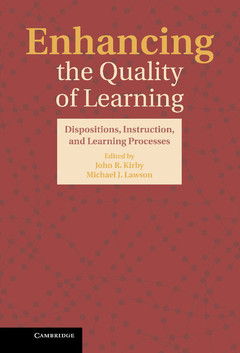Description
Enhancing the Quality of Learning
Dispositions, Instruction, and Learning Processes
Coordinators: Kirby John R., Lawson Michael J.
This book reviews current research on the nature of high quality learning and the factors that facilitate or inhibit it.
Language: English
Subject for Enhancing the Quality of Learning:
Publication date: 05-2012
414 p. · 15.2x22.9 cm · Hardback
414 p. · 15.2x22.9 cm · Hardback
Description
/li>Contents
/li>Biography
/li>
High quality learning is extensive, well integrated, deep, and supports the use of knowledge in new situations that require adaptation of what has been learned previously. This book reviews current research on the nature of high quality learning and the factors that facilitate or inhibit it. The book addresses relationships between quality of learning and learners' dispositions, teaching methods, cognitive strategies, assessment and technologies that can support learning. The chapters provide theoretical analyses, reports of classroom research, and suggestions for practical application for both teachers and learners. The book will be of value to teachers at all levels of education and provides guidance for students about how to approach classroom tasks in order to develop high quality learning.
1. An introduction to the quality of learning Michael J. Lawson and John R. Kirby; 2. The quality of learning at university: integrative understanding and distinctive ways of thinking Noel Entwistle; 3. Dispositions and the quality of learning Augusto Riveros, Stephen P. Norris, Denyse V. Hayward and Linda M. Phillips; 4. Education for rational thought Maggie M. Toplak, Richard F. West and Keith E. Stanovitch; 5. Individual differences that affect the quality of learning in doctoral candidates Robert H. Cantwell, Jill J. Scevak, Syd Bourke and Allyson Holbrook; 6. Enhancing learning through constructive alignment John Biggs; 7. Framing the features of good quality knowledge for teachers and students Michael J. Lawson and Helen Askell-Williams; 8. Theory building and the pursuit of understanding in history, social studies, and literature Carl Bereiter and Marlene Scardamalia; 9. Fostering self-regulated learning by journal writing - how should instructional support be designed to promote high quality learning? Matthias Nuckles, Sandra Huber and Alexander Renkl; 10. Promoting learning skills in undergraduate students Allyson Fiona Hadwin and Philip H. Winne; 11. Using technology to foster meaningful learning environments Neil H. Schwartz and Richard Schmid; 12. Deeper learning in reading comprehension John R. Kirby, Kate Cain and Bozena White; 13. Quality learning from texts we read: what does it take? Panayiota Kendeou and Gregory Trevors; 14. Studying multiple documents: cognitive process and instructional implications Anne Britt and Jean-Francois Rouett; 15. Knowledge acquisition from verbal and pictorial information Wolfgang Schnotz, Christiane Baadte, Amy Johnson and Christoph Mengelkam; 16. Future directions John R. Kirby and Michael J. Lawson.
John R. Kirby is a Professor of Educational Psychology at Queen's University, Kingston, Ontario, Canada. He is a graduate of McGill University and the University of Alberta. Prior to 1987, he taught in the Faculty of Education at the University of Newcastle, Australia. He has been president of the Canadian Association for Educational Psychology and a member of the Board of the Society for Scientific Studies of Reading. He is a member of the American Psychological Association, the European Association for Research in Learning and Instruction and the Society for Scientific Studies of Reading. He is a Fellow of the Association for Psychological Science. His research interests concern the psychology of reading and learning from text. Current research projects include the development of the cognitive processes underlying learning to read (especially phonological awareness, naming speed, orthographic processing and morphological awareness), dyslexia in university students, cognitive processes in reading comprehension and learners' use of text and graphics in studying. He has published 5 books and more than 100 research articles.
Michael J. Lawson is Professor of Education at Flinders University, Adelaide, Australia. Until recently he was Director of the Educational Futures Research Institute at the university, where a focus of his work was establishing school-university research partnerships. He is a member of the Australian Association for Research in Education and the American Educational Research Association. A graduate of Monash University and the University of Alberta, his teaching and research focus on applications of cognitive psychology to teaching and learning, particularly the use of strategies for learning in classroom and study situations. In recent years his research has been concerned with teachers' facilitation of student use of learning strategies.
Michael J. Lawson is Professor of Education at Flinders University, Adelaide, Australia. Until recently he was Director of the Educational Futures Research Institute at the university, where a focus of his work was establishing school-university research partnerships. He is a member of the Australian Association for Research in Education and the American Educational Research Association. A graduate of Monash University and the University of Alberta, his teaching and research focus on applications of cognitive psychology to teaching and learning, particularly the use of strategies for learning in classroom and study situations. In recent years his research has been concerned with teachers' facilitation of student use of learning strategies.
© 2024 LAVOISIER S.A.S.




